Tuesday Feb 24, 2026
Tuesday Feb 24, 2026
Monday, 10 February 2020 00:00 - - {{hitsCtrl.values.hits}}
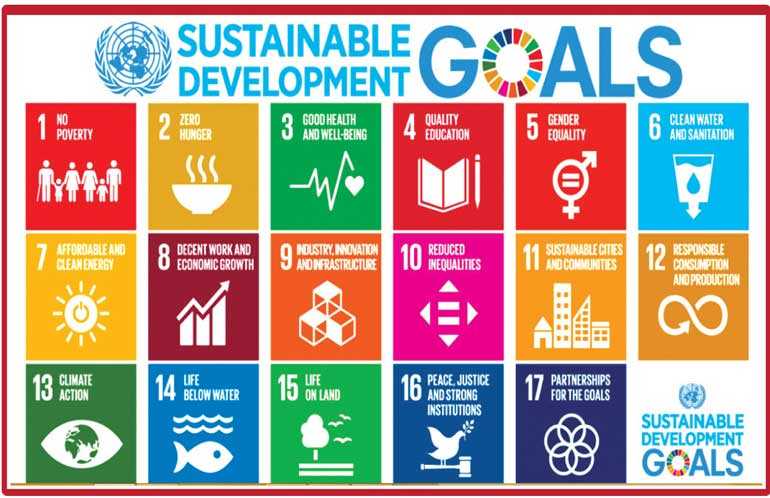
In Sri Lanka, we talk about the role of a citizen with different interpretations. How we can contribute to the development of the nation as citizens is something which should be redefined in this context. But this article aims to discuss the challenges of Sri Lankan universities in terms of producing management graduates of global quality.
Who is a ‘Graduate’?
Many experts want to link employability with the graduate output of the country. They like to use the word ‘employability’ in the definition of ‘graduate’. I consider this very similar to ‘Marketing Myopia’, a short-sighted and inward-looking approach to marketing that focuses on the needs of the company instead of defining the company and its products in terms of the customers’ needs and wants. If we want to define a graduate for operationalisation, the Weliwitiye Sri Soratha Thero, pioneer of the University of Sri Jayewardenepura, offers a great insight. 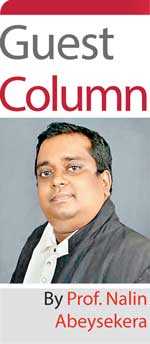
“It is our mission to present society with an intellectual, not merely to breed graduates. If one endeavours to transform this sacred abode into a place where degrees are sold, or one in which students are given degrees in a mere mechanical fashion, it will only lead the university as well as the country into disgrace. If our graduates have not proven the expected intellectualism their degree claims they possess, people will indubitably arrive at the conclusion that our university is a ‘store’ where degrees are ‘sold’. Thus everybody affiliated with the university should keep in mind not to engage in any act that will undermine the quality of our degree and research work.”1
Expected intellectualism
Hence, one can argue that the mere usage of ‘employability’ in the definition of the graduate underestimates its true meaning. I would like to elaborate on the term “expected intellectualism” mentioned by Reverend Weliwitiye Sri Soratha Thero. An intellectual is a person who engages in critical thinking and reading, research and human self-reflection about society. The key requirements of the intellectual is not only thinking and reading but human self-reflection. In other words, a graduate who has Intelligence Quotient (IQ) and Emotional Intelligence (EI).
Intelligence Quotient (IQ) and Emotional Intelligence (EI)
According to Forbes: “IQ tests are used as an indicator of logical reasoning ability and technical intelligence. A high IQ is often a prerequisite for rising to the top ranks of business today. It is necessary, but not adequate to predict executive competence and corporate success. By itself, a high IQ does not guarantee you will stand out and rise above everyone else.”
The same article reveals that the research carried out by the Carnegie Institute of Technology shows that 85% of one’s financial success is due to skills in “human engineering,” as well as personality and ability to communicate, negotiate and lead. Shockingly, only 15% is due to technical knowledge. Additionally, Nobel Prize-winning Israeli-American psychologist Daniel Kahneman found that people would rather do business with a person they like and trust rather than someone they don’t, even if the likable person is offering a lower quality product or service at a higher price. So there are many factors to be considered in voting other than one’s “brain”.
In this context, the concept of Emotional Intelligence (EI) is very important. According to Goleman (who is an author, psychologist, and science journalist; for 12 years, he wrote for The New York Times, specialising in psychology and brain sciences), EI is a construct that includes an array of positive attributes including political awareness, self-confidence, conscientiousness and achievement motives, rather than focusing only on an intelligence that could help individuals solve problems effectively (Brackett & Geher, 2006). In his 1996 book Emotional Intelligence, Goleman argued that EQ (or Emotional Intelligence Quotient) might actually be more important than IQ.
IQ is still recognised as an important element of success, particularly when it comes to academic achievement. People with high IQs typically to do well in school, often earn more money and tend to be healthier in general. But today experts recognise it is not the only determinate of life success. Instead, it is part of a complex array of influences that includes emotional intelligence, among other things.
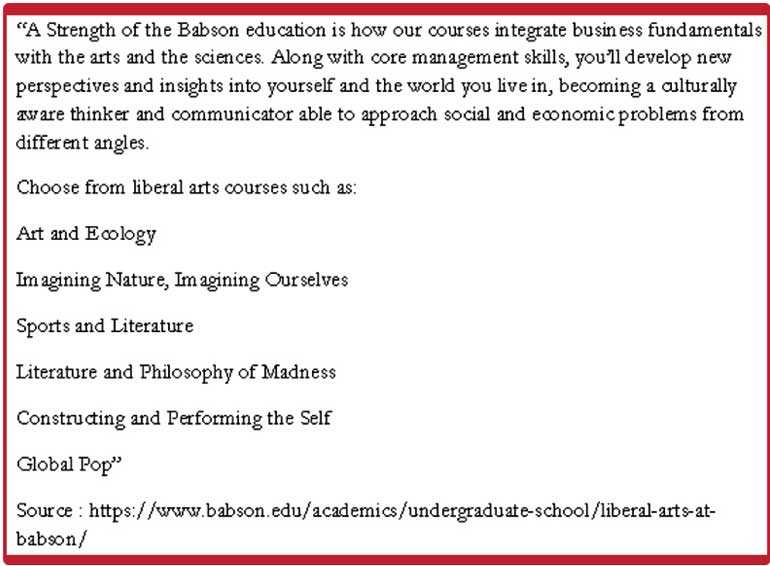
Adyapanaya and Dyapanaya
When we study philosophy we learn of Adyapanaya and Dyapanaya. Adyapanaya mainly discusses how we fill our brains with facts; Dyapanaya elaborates on how we deal with our hearts. Some studies mention that in ancient times the admissions of some universities were based on Dyapanaya, which we can easily relate to as Emotional Intelligence.
Imaginative power with creativity
A turbulent business environment demands that business practitioners study the market carefully. To be competitive and become a ‘hit’ in the market there is a need for proper ‘business sense’. For this, one should have more imaginative power with creativity. A certain percentage of this is genetic. Nevertheless, one can also learn how to sense the business environment. Following only core subjects and given materials in one’s university will result in becoming only a machine without that sense. In view of this, we now see recognised international business universities offer different combinations of subjects in their curriculum.
A good example (refer to the given box) is the Babson Business School in Massachusetts, US (Babson’s MBA program has been ranked number one in entrepreneurship for 21 consecutive years by US News and World Report and is ranked 58th overall in the Bloomberg BusinessWeek 2014 rankings. Babson’s undergraduate business program is ranked 26th overall in the Bloomberg BusinessWeek 2014 rankings).
We can see some combinations that are very important to developing a better business professional in the long run. In Sri Lanka too, some universities have already started to offer optional courses such as Fine Arts in their curriculum. William M. Sullivan, a senior scholar at the Carnegie Foundation for the Advancement of Teaching, argued that Liberal Arts programs would help students cultivate “practical reasoning” and prepare them for the world of work (Glenn, 2010). It can also be observed that a section of students (especially Generation Y) have a problem with empathy, despite their academic credentials 2 Therefore, we see that there is a real need for adaptability in subject combinations, especially with the advent of globalisation.
Personal – Social responsibility vs. Sigalovada Sutta
In this context, as a graduate you need to identify the real meaning of ‘Responsibility’. The Association of American Colleges and Universities categorised ‘Five Dimensions of Personal and Social Responsibility’ as the following.
1. Striving for excellence – developing a strong work ethic and consciously doing one’s very best in all aspects of college
2. Cultivating personal and academic integrity – recognising and acting on a sense of honour, ranging from honesty in relationships to principled engagement with a formal academic honour code
3. Contributing to a larger community – recognising and acting on one’s responsibility to the educational community and to the wider society, local, national and global
4. Taking seriously the perspectives of others – recognising and acting on the obligation to inform one’s own judgment; engaging diverse and competing perspectives as a resource for learning, citizenship, and work
5. Developing competence in ethical and moral reasoning – developing ethical and moral reasoning in ways that incorporate the previous four dimensions, and using such reasoning in learning and in life.
Aligned with this, Colby and Sullivan in their article ‘Strengthening the Foundations of Students’ Excellence, Integrity, and Social Contribution’ explained the importance of “practical reasoning”.
“Students need to experience engagement with the world so that they grasp the practical, personal and moral significance of what they are learning. Hence, the importance of practical reasoning. We see this is the best kind of preparation for a career; teaching practices that place students in their future roles as business people or nurses or teachers or other professionals so that they can experience the many dimensions of knowledge, skill, and responsibility needed to practice these demanding occupations (Colby and Sullivan, 2009).”
Moreover, a researcher can study the Five Key Dimensions of Personal and Social Responsibility with the Sigalovada Sutta (advice to Sigala) in the Digha Nikaya, which more philosophically and broadly articulates how people need to respect society by having a better understanding of their duties and responsibilities as individuals.
UN Sustainable Development Goals (SDGs)
The Sustainable Development Goals are a list of goals for the global community designed to be a “blueprint to achieve a better and more sustainable future for all”. The SDGs, set in 2015 by the United Nations General Assembly, are intended to be achieved by the year 20303.
The Research Repository of the University of the West of England (UWE), Bristol, have examined its portfolio of programs, its public and community engagements and research activities. In so doing, it has created a baseline assessment of the contribution of its arts, creative industries, education, health, science, business, law, environment and technology disciplines to meet the SDGs4. Reproduced on this page is a section in which the University of the West of England (UWE) addresses the SDGs in their different categories.
Global management graduate attributes
This context is important to examine what sort of attributes are considered important to be a “global management graduate”. Interestingly, the article published by Dee Allen and Colin Simpson discuss the attributes of a business management graduate for the year 2020. (Refer to the table for the details.)
In the article, they categorise System Thinking, Global Literacy, Change Capability, Digital Literacy, Ethical Entrepreneurship, Critical thinking and Business-ready Mindset as the main attributes of a business management graduate. At the moment, the University Grants Commission (UGC) in Sri Lanka also has some twelve categories of learning outcomes under core areas such as knowledge, skills, attitudes, values, professionalism and vision for life, mindset and paradigm.
All of the above are general targets for all graduates and there is a need to specify this accordingly for management graduates. The challenge for Sri Lankan universities is to see how they can adapt it into our own Sri Lankan equation by aligning it with our own value system and culture.
Conclusion
Sri Lankan universities face many challenges, one of which is to produce a global gradate with “sense”. We hear many people talking about “soft skills”, criticising the output of national universities, claiming that most of the graduates do not have them. The same set of people defines soft skills as “language competency and IT skills”. But I do not agree. We need to see the Big Picture. The Big Picture is not mere “employability”; rather, it is a concept we need to investigate with many perspectives. This calls for a paradigm shift in higher education.
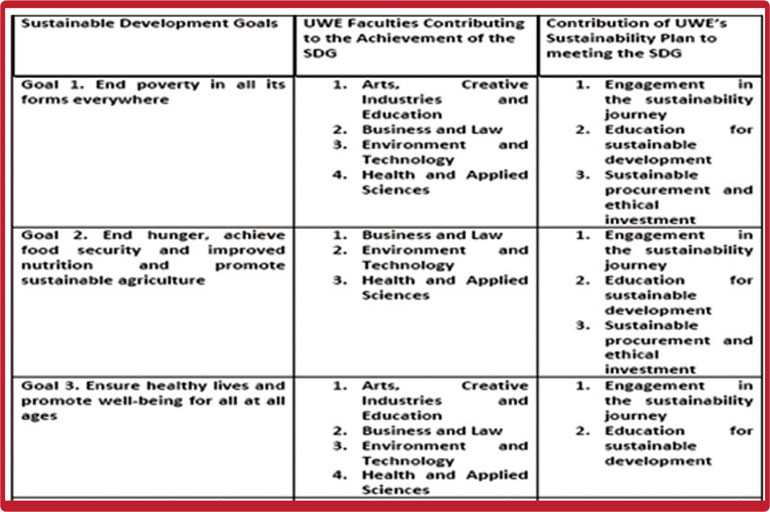
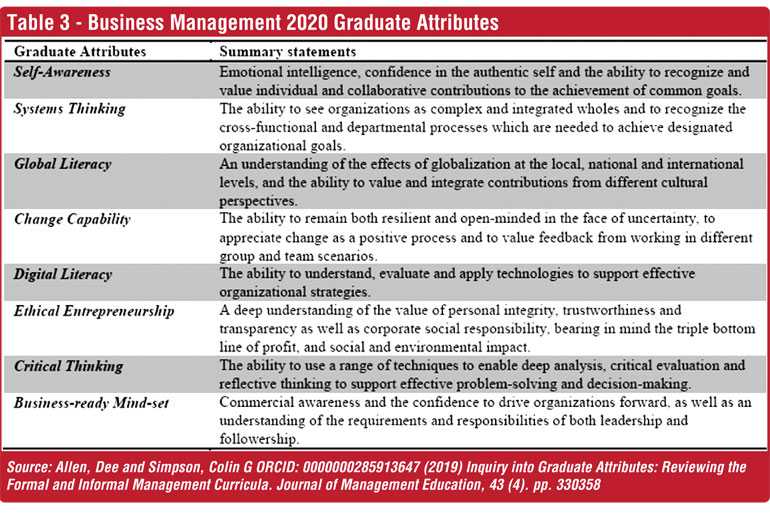
(This article is based on a guest lecture done for the Faculty of Management, University of Peradeniya. The writer is a Professor in Management Studies at the Open University of Sri Lanka. He can be contacted on [email protected])
Commemoration speech of Rev Weliwitiye Sri Soratha Thero (http://www.sjp.ac.lk/news/commemoration-speech-on-rev-weliwitiye-sri-soratha-thero/).
‘Wanted! A Nation with Empathy’ – The Island (http://www.island.lk/index.php?page_cat=article-details&page=article-details&code_title=201032).
17 Sustainable Development Goals (https://www.un.org/sustainabledevelopment/sustainable-development-goals/)
(https://uwe-repository.worktribe.com/output/919107)
Source: Allen, Dee and Simpson, Colin G ORCID: 0000000285913647 (2019) Inquiry into Graduate Attributes: Reviewing the Formal and Informal Management Curricula. Journal of Management Education, 43 (4). pp. 330358